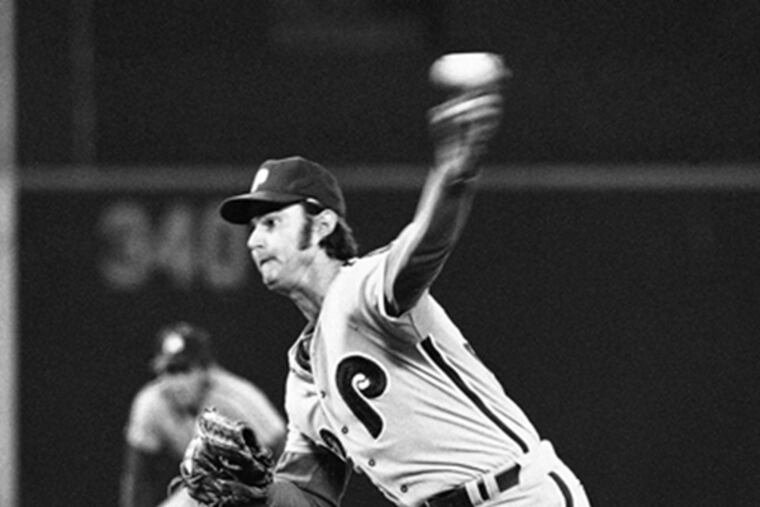How Carlton '72 shows how bad Phillies '15 are
The fly ball left Joe Torre's bat and landed in Willie Montanez's glove in Busch Stadium's center field. By then, the astonishing had become routine. This was Aug. 5, 1972, and Montanez's catch completed a 5-0 victory for the Phillies, in a tidy 108 minutes, over the St. Louis Cardinals - Steve Carlton's 17th win that year, his sixth shutout, just another night of brilliance during one of the most brilliant seasons of starting pitching in Major League Baseball history.

The fly ball left Joe Torre's bat and landed in Willie Montanez's glove in Busch Stadium's center field. By then, the astonishing had become routine. This was Aug. 5, 1972, and Montanez's catch completed a 5-0 victory for the Phillies, in a tidy 108 minutes, over the St. Louis Cardinals - Steve Carlton's 17th win that year, his sixth shutout, just another night of brilliance during one of the most brilliant seasons of starting pitching in Major League Baseball history.
But there's an interesting footnote to that game that's revealed if you review its box score nearly 43 years later. The Phillies' victory was their fifth in a row, and it raised their record at the time to 39-62. That's the interesting footnote. That second number: 62.
That's how many losses this year's Phillies have. In mid-July.
So with the Phillies' post-all-star-break schedule beginning Friday night against the Miami Marlins, with their record a humiliating 29-62, with the possibility looming that they will trade Cole Hamels and Jonathan Papelbon before month's end, let's play a little game. Let's imagine that Carlton '72 pitched for Phillies '15. It's always fun to try these what-if exercises (even if there's no way to compare such disparate eras and teams with complete precision and accuracy), and it will provide a measure of just what baseball fans in the Delaware Valley have had and will have to endure this summer.
Carlton's performance in 1972 has long been held in reverence. He led the National League in each of the following categories: wins (27), starts (41), complete games (30), innings (3461/3), strikeouts (310), earned-run average (1.97), ERA-plus (182), fielding-independent pitching (2.01), and strikeout-to-walk ratio (3.56). It would have been an incredible season on a pennant contender, but it was made all the more remarkable by the quality of the team for which Carlton pitched. The 1972 Phillies went 59-97, finishing last in the National League East, 11 games behind the fifth-place Montreal Expos. (No team played more than 156 games that year because of a 13-day players strike in April.) It was always that context - a year of dominance for a club that was, by any reasonable standard, galactically awful - that elevated Carlton's season to legend.
One of the pillars of that legend has been that Carlton's teammates, by his mere presence on the mound every fourth day, transformed themselves from all-thumbed nincompoops into competent big leaguers.
"We just had a different attitude," Phillies bench coach Larry Bowa, the starting shortstop on that '72 team, told authors Steve Bucci and Dave Brown in Drinking Coffee With a Fork, their book about Carlton's '72 season. "As a coach or manager, you know your players have a different look when your ace is pitching. But to this day, I have never seen a look or feel like when Carlton pitched that year. He took it to another level, and he took the people with him to another level."
The statistics bear out Bowa's assertions. The '72 Phillies averaged 3.22 runs per game over their 156 games, the second-lowest figure in the National League. But Carlton's average run support that season was 3.83 - a jump of more than three-quarters of a run per game from what the Phillies scored for such immortals as Ken Reynolds, Bill Champion, and Woody Fryman. Based in part on that relative surge in offense, the '72 Phillies had a 29-12 record when Carlton pitched.
That improvement stands in stark contrast to the '15 Phillies' regression when their best starter pitches. This year's team is last in the majors in scoring, averaging 3.38 runs per game, but Hamels' run support over his 18 starts has been 2.68 - more than a run per game less than what Carlton got in '72. (Somehow, the Phillies are still 8-10 when Hamels pitches.)
Put the '15 Phillies behind '72 Carlton, then, and have them provide the same run support that they've given Hamels, and you get a sense of just how terrible this year's team is. The 2015 Phillies would have a 25-16 record over Carlton's starts. They'd be four games worse than the '72 Phillies were when he pitched. Think about that. The '72 season was the greatest of Carlton's 24-year, Hall of Fame career, maybe the greatest of any starting pitcher over the last half-century, and if he were pitching today, he would have to be even better to lift this year's Phillies team as high as he lifted that one.
Take heart, Phillies fans. You're witnessing something truly special.
@MikeSielski